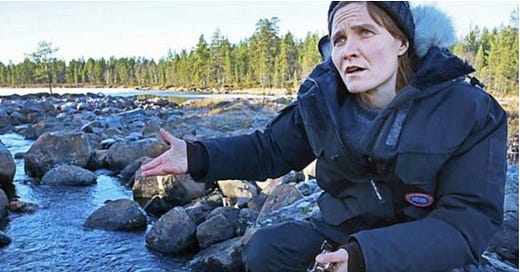Supporting the salmon’s return to its traditional homewaters
Sami take the lead in defining success in restoration of salmon spawning areas
“The river cannot be separated from the families, and the families cannot be separated from the salmon…It was our people who first started to observe that the family of the salmon coming to the Näätämö river is changing. We mind about this since we have no elsewhere to go.””
Pauliina Feodoroff, President of the Skolt Sámi Nation Council

The Sámi are the only indigenous people of the European Union. They fought successfully to have their autonomy represented in the Finnish Constitution, which was amended in 1995 to guarantee the rights of the Sámi to maintain and develop their own language, culture and traditional livelihoods.
The role of fishing in Sámi life is a key part of the culture because despite the waning of traditional reindeer herding, almost all Sami families still fish. According Pauliina Feodoroff, a Sámi leader of the Näätämö river project,
“Fishing is not only providing the food and handicraft materials and the sense of self-sufficiency, but it also the way of living that still brings the traditional laws concerning the land use and family areas to this day.”
Personal Connection
We first heard of this project as Sox researched the work of the Sámi and their ongoing struggles to defend their land and rights in Finland. This project models successful collaboration in action-based research between a local Indigenous community, the Skolt Sámi, and international science partners.
The Näätämö River Collaborative Management
In 2009 the Skolt Sámi envisioned a future based on Indigenous knowledge to develop a community-based climate adaptation plan. The visioning resulted in the Näätämö River Collaborative Management Plan, based in the Skolt Sámi traditional salmon fishery, with the goal to increase salmon productivity while monitoring the health of the salmon and restoring damaged habitat.
According to Sami project leader Pauliina Feodoroff,
“There is so much research done in Sami areas, both about nature and Sami cultures, that is kind of hanging in the air. A narrow and in best cases, a sharp slice of knowledge has been gathered and refined but why and for what is never clear and that unrooted knowledge somehow just floats, disturbed. Because when you start to know about something, it becomes a relationship. And the more you know, it becomes also a relationship with responsibilities. Since you now know better, you have to act accordingly. And the last part is too many times missing.”
The partner organization in this project is the Snowchange Cooperative, a network of Indigenous cultures around the Arctic, established by Finns devoted to the advancement of traditional knowledge, stories, handicrafts, fishing and hunting and other elements of sacred forest culture.
You can contact Snowchange for donations to this and other Sami projects by sending an email to Tero Mustonen at contact@snowchange.org.
We hope that you will consider learning more about the projects we’re featuring and supporting them. We look forward to sharing our future posts on themes of food sovereignty, language preservation and more!
If you found this insightful, inspiring, or thought-prokoking in any way…
We’d love to hear your thought! We’ll respond!
The Proven Sustainable™ Conversation Series is a fiscally sponsored project of the Center for Transformative Action, a 501(c)3 tax-exempt organization.




Four Arrows - This is a clear and nuanced reply to a disturbing conclusion from the Nature article's authors. I hope this breath of understanding carries far and wide. Gratitude for your ongoing voice in support of so many whose voices have been rendered silent by the academy for far too long.
I really enjoyed learning other indigenous perspectives on water/wai and aspects resonated with Māori worldviews.
Water is life 💧🩵🦋. Arohanui 💥❤️🐦🔥